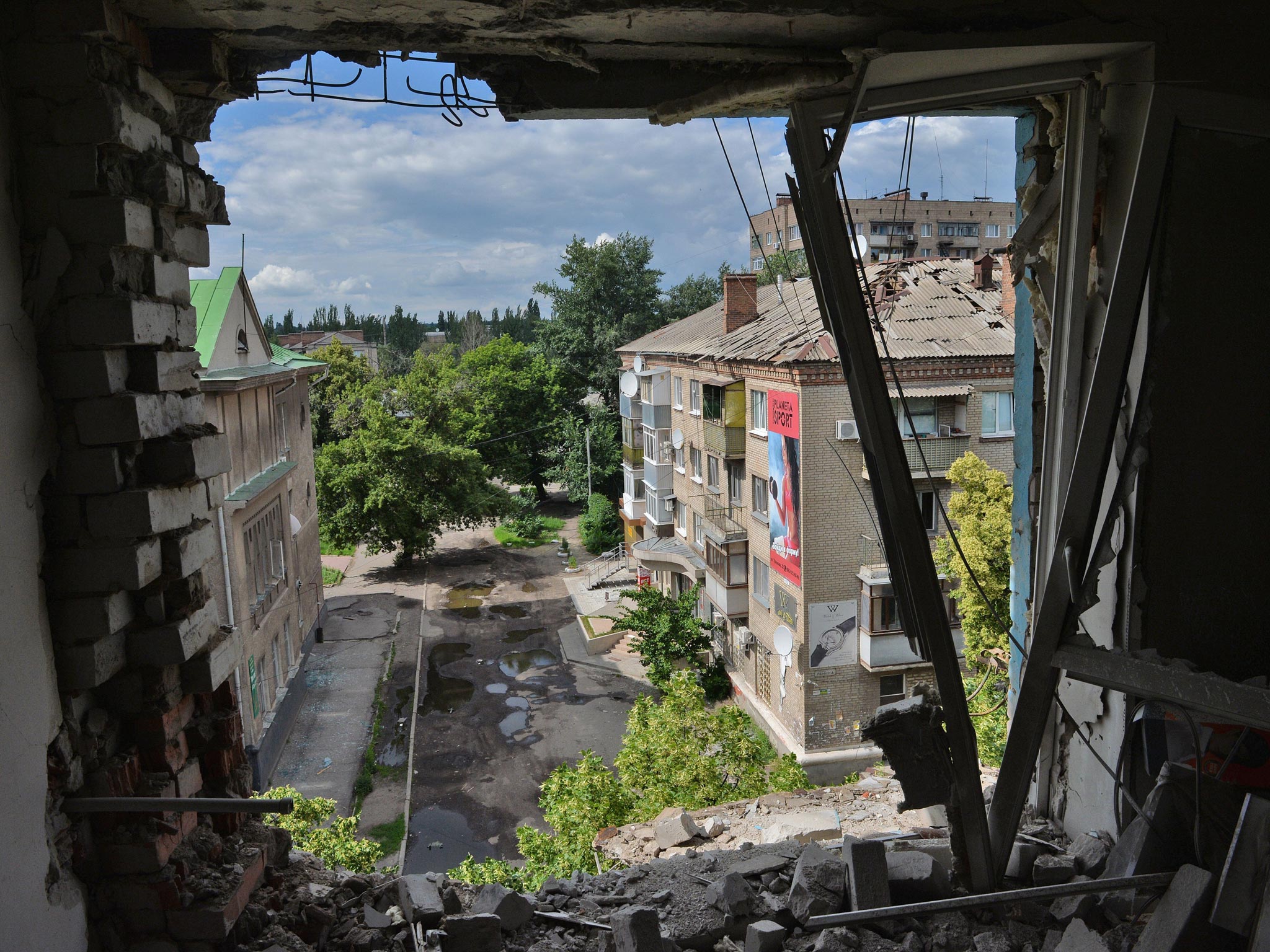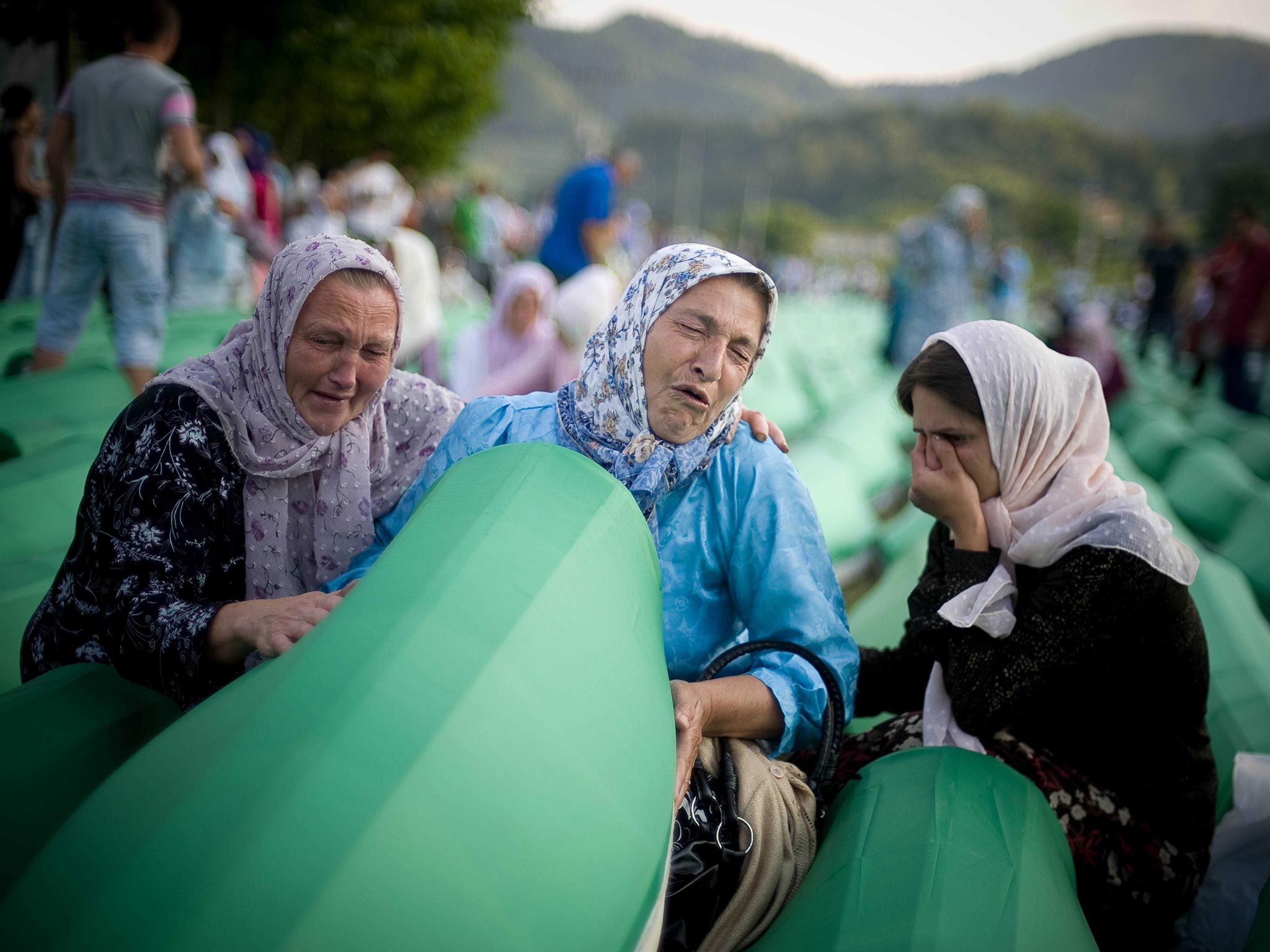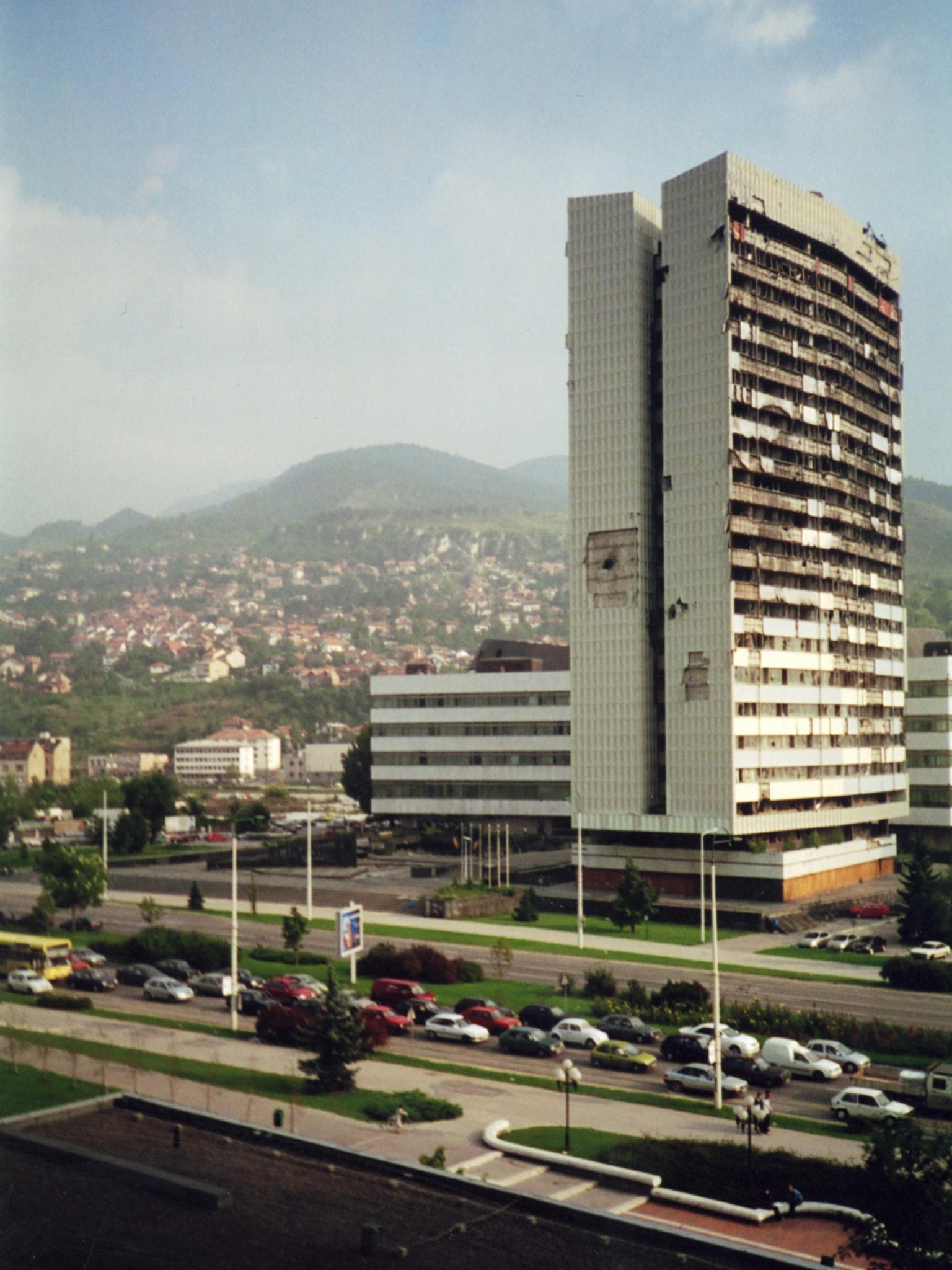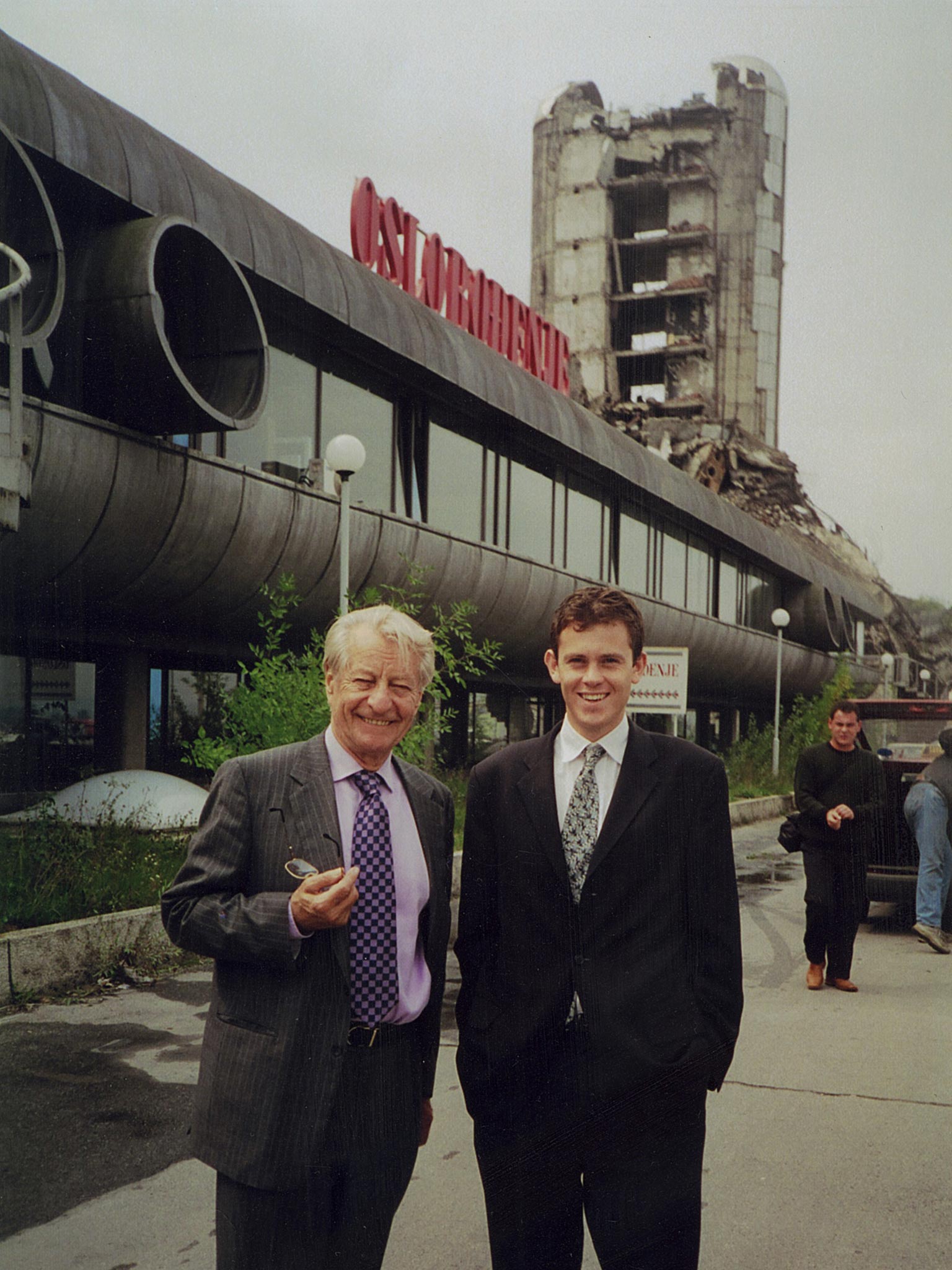Ukraine crisis: Europe is averting its eyes - have we not learnt from history?
Will Gore, who saw Bosnia's reconciliation process at first hand, argues that the muted response of many in the West is a malaise borne of nearly 70 years of relative peace in Europe

Your support helps us to tell the story
From reproductive rights to climate change to Big Tech, The Independent is on the ground when the story is developing. Whether it's investigating the financials of Elon Musk's pro-Trump PAC or producing our latest documentary, 'The A Word', which shines a light on the American women fighting for reproductive rights, we know how important it is to parse out the facts from the messaging.
At such a critical moment in US history, we need reporters on the ground. Your donation allows us to keep sending journalists to speak to both sides of the story.
The Independent is trusted by Americans across the entire political spectrum. And unlike many other quality news outlets, we choose not to lock Americans out of our reporting and analysis with paywalls. We believe quality journalism should be available to everyone, paid for by those who can afford it.
Your support makes all the difference.It's a funny thing about globalisation that it has had little impact on parochialism. As the European Parliament elections in May showed all too clearly, local interests and national identities retain considerable popular power in the face of government policies that are perceived to encourage cross-border openness.
Likewise, while international travel and communication has become ever easier, genuine public interest in and understanding of events that happen in distant corners of the globe can seem intermittent at best. The gradual starving of traditional news media resources has left a gap that the rise and rise of social media has failed to fill. All too often, map graphics on the evening news signify a comforting distance from trouble rather than encouraging empathy with a shared human experience.
The ongoing civil unrest in Ukraine is in part a product of parochialism. The muted response of many in the West is a symptom of the same thing and of a malaise borne of nearly 70 years of relative peace in Europe, if not elsewhere.
It was different 20 years ago. As the Cold War reached its conclusion with a wave of peaceful revolutions and, ultimately, the dissolution of the USSR, hopes for the future were high enough for Francis Fukuyama's The End of History and the Last Man to become a bestseller. But the corollary of high hopes is an acute anxiety about their not being realised. Much as there was a degree of surprise in the West about the lack of conflict as the Soviet Union collapsed, so there was intense dismay at the vicious wars that followed the subsequent break-up of Yugoslavia.
Of course, in 1991 the collective memory of the Second World War was a great deal clearer than it is today. And Europe had been living with the expectation of a third major conflict ever since the Iron Curtain had descended from Stettin in the Baltic to Trieste in the Adriatic, as Churchill put it in 1946. Nevertheless, the sense of shock that full-blown war – even of the civil sort – could break out not just in Europe but in a part of the Continent that had been beyond Soviet control (if not influence) was resoundingly real.
As a young teenager with an unhealthy interest in Second World War-era aircraft, I found the conflicts that broke out in Slovenia, then Croatia and finally Bosnia and Herzegovina, horrible but fascinating. They were explicable in the context of the 20th century and, in the way they were fought, fairly conventional. Nationalism, artillery, trenches, snipers, sieges: this was a familiar language. Even "ethnic cleansing" had a hideous echo in the not-so-distant past.
Media and political debate about the Yugoslav conflicts was intense, but it was not until Nato took decisive action following the massacre at Srebrenica that the Bosnian war was brought to a halt. The Dayton Agreement formally signalled its conclusion in December 1995 after three and a half years of fighting. And that seemed to be that: an awful war brought to a conclusion by an imperfect but workable peace settlement. I got on with my A-levels.

The main road into Sarajevo from the city's airport is long and straight. I drove along it for the first time in the early autumn of 2002, when everything was hot and dusty. Washing hung from lines strung between apartment windows and across balconies. The road was busy, full of taxis. And the scars of war were still abundant. New buildings, often glassy and colourful, stuck out against the swathes of bullet-streaked concrete. Here and there, clusters of apartments remained burnt-out and presumably uninhabited. The pockmarks left by shellfire had either been left unrepaired or hastily filled with a different kind of mortar. The siege of Sarajevo had lasted for a little under three years yet the reconstruction was far from complete some seven years after its encirclement had been broken.
The reasons that I came to be in Bosnia were emblematic of the continued uneasiness of the post-war state. In the immediate aftermath of the war, the broadcasting of "hate speech" on television and radio had been identified as one of the drivers of ethnic division. The "internationals", who were effectively in charge of a new broadcasting regulatory authority, had introduced a strict regime to control broadcast licences. There were many who believed that the same approach should be taken towards the press.
However, Dieter Loraine, a Brit working for the broadcast authority, was concerned that such strict controls would be unconducive to the redevelopment of a genuinely free press. He therefore encouraged Bosnia's various journalist and publisher associations, which numbered half a dozen, to consider a system of self-regulation.
The establishment of a national, self-regulatory press council is not an easy task. The natural suspicion publishers have for one another the world over was magnified in Bosnia by everything that had happened in the previous decade.
It soon became evident that even if all the participating associations could accept the notion and functions of a press council, they could not agree on the identity of a local chairman. Instead, they turned to the UK, appointing as their head first Lord Wakeham, the chairman of the Press Complaints Commission (PCC), then Professor Robert Pinker, the London School of Economics academic, who acted up for a year at the PCC when Lord Wakeham stepped down. Prof. Pinker remained as chairman of the Bosnian Press Council for several more years until it was ready to loosen the international apron strings. Since I oversaw the PCC's relationship with its counterpart bodies abroad, I became Prof. Pinker's adviser. Press Council meetings could not always take place in Sarajevo as that would show a lack of respect to the Serbs and Croats whose populations were largely centred elsewhere. As such, the location would rotate.
Banja Luka gave me my first taste of the country in March 2002. It had not been affected by the fighting and its streets bore none of the evidence of battle. Yet in many ways the city was a symbol of how the war had played out: more than 50,000 Bosniak and Croat residents and refugees had been expelled; all 14 of its mosques had been destroyed. In the months before the Press Council first met there, Serb nationalists were arrested during protests against the rebuilding of its most famous mosque, the Ferhadija.

In a late-night hotel bar, the sort in which groups of mostly men met, drank and talked in hushed tones, I asked a magazine editor from Sarajevo about the atrocities that had been committed by Serb forces and about how effective the search for Radovan Karadzic really was. I was advised to talk about something else. There were, he made clear, people in the bar who would not be keen on my topic of conversation, nor averse to teaching a naive Westerner a lesson.
Mostar, by contrast, had seen intense military action and had been the subject of huge attention in the West because of the destruction of its historic bridge by the Croats, who had initially been allied to Bosniak Muslim forces before turning against them. In 2003, the bridge was still being rebuilt; some of the buildings around it were little more than rubble. On a wall close by, somebody had scrawled in English: "How do you sleep?"
Yet it was in Sarajevo that reminders of the war were most obvious. We stayed at the Holiday Inn on "Sniper Alley", which had become famous for being the base for Western reporters during the siege by Bosniak Serb forces. My room there looked directly out on to the still-ruined parliament building. At a Press Council dinner at a restaurant in the hills above the city, I was told casually that the area immediately around had been an excellent site for heavy artillery because of the clear line of vision into Sarajevo's central districts. Up in the mountains beyond, ski runs and other remnants of Yugoslavia's triumphant Winter Olympics of 1984 lay unused.
It was also in Bosnia's capital where hopes for reconciliation were most manifest. Despite the displacement of many Croat and Serb residents (the population of the city fell by nearly a third between 1991 and 1998), it was undoubtedly cosmopolitan. Paddy Ashdown, who at the time was the country's High Representative – appointed as part of the Dayton Agreement to oversee its civilian implementation – told us that he felt genuinely optimistic; that the city was capable of being the symbol of Bosnia and Herzegovina's united future, just as it had been the symbol of a fractured past. He may well be right, in time.
Even so, a further decade on and, while the Press Council of Bosnia and Herzegovina has sustained (with a local chairman), the country still faces many difficulties. The statistics of war suggest that this is no particular surprise. It left 100,000 and more dead, some as the deliberate victims of genocide. More than two million people were displaced, many ethnically cleansed. Estimates suggest that up to 50,000 women were raped. It was a brutal, senseless conflict which cannot be wiped from the consciousness of those affected. Today, the Bosnian economy is not alone in being in the doldrums, but, with unemployment running at 40 per cent, its problems are particularly acute.

Unrest in February of this year – notably in Sarajevo and Tuzla – sprang from frustration with the government's inability to tackle the jobs shortfall and to bring endemic corruption to heel. Tensions between the constituent communities can still flare. As recently as a month ago, the incumbent High Representative, Valentin Inzko, noted the continuing divisions: "In 2014, no one should be challenging Bosnia and Herzegovina's right to exist, and yet this is what we continue to encounter. The Dayton Peace Agreement does not allow the entities to secede and so such cheap rhetoric is a waste of time and energy given the real problems faced by this country in its entirety."
The floods that ravaged Bosnia in May shifted mines laid during the war, bringing an extra dimension to the horrors of the overflowing torrents. But if this natural catastrophe can bring a degree of unity to a country so torn by man-made disaster, it may help to wash away some of the festering sores of conflict. More prosaically, a strong performance at the World Cup would not go amiss either.
In Ukraine, meanwhile, where the protagonists are as defined by nationalistic instinct as they were in the Balkans, the lessons of history seem to go unheeded. With a new president in Kiev and with Vladimir Putin fresh from getting the hard word from G7 leaders in Paris, perhaps there is a chance for peace. Yet how much either can – or wants to – control the situation on the ground in cities such as Sloviansk and Luhansk, where fighting has continued in the past fortnight, remains to be seen.
In the West, the experience of military involvement in Iraq and Afghanistan has inevitably taken its toll on the public's appetite for foreign fights. And when we think of war in the 21st century we immediately think Middle East.
With the European project under threat like never before, the prospect of conflict in a far-flung corner of the Continent is for many "a quarrel in a faraway country between people of whom we know nothing", as Neville Chamberlain famously put it in September 1938. That his remark should have increasing resonance in 2014, after decades of globalisation and in the year that marks the 100th anniversary of another war that had its powder keg lit in Sarajevo, is a troubling thing indeed.
Join our commenting forum
Join thought-provoking conversations, follow other Independent readers and see their replies
Comments